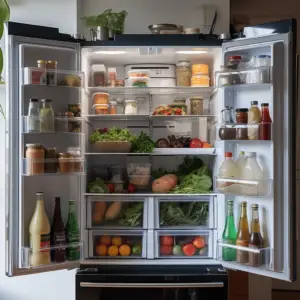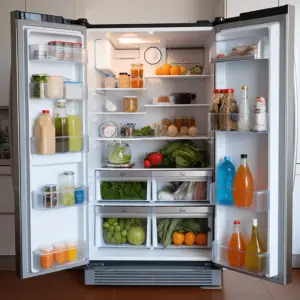As the food inside the fridge spoils, you might realize that a clicking noise also accompanies the cooling effect. That is the undisputable indication that your fridge needs immediate intervention. Fortunately, the causes of the cooling and clicking sound can be identified, and fixing them is pretty easy.
Various issues can lead to the clicking noise of your fridge. For example, it can be due to faulty condenser coils, bad compressor, spoilt condenser fan or poor start relay. You can stop the clicking noise and cooling of your fridge without contacting a technician or spending a lot of money. Follow this guide to know how.
Table of Contents
Fridge Is Making a Clicking Noise: What Could be the Problem and How to Fix it

Read this brief to the end to figure out the issues you’re encountering if your refrigerator produces a clicking noise and you find a pool of water or rotten food after some time. Here are some of the reasons your fridge is making a clicking noise.
-
Bad Compressor
Your fridge uses a cool gas called coolant to keep the interior area cold and prevent spoilage of food and drinks. The coolant is typically contained in the compressor, and if there is any issue with the compressor itself, it will produce some weird noise.
With that said, the bad compressor is the number one factor that can lead to the clicking noise of a refrigerator. A spoilt compressor is repaired by replacing it entirely with a new one.
Your fridge’s motor is always giving you trouble. If you don’t notice a problem with the condenser until you get rid of food or drinks that you can’t eat or drink, it could take days or months.
The part of the fridge that uses the most power is the motor. The cost of the fridge can go up if you turn it on and off a lot. Some energy-efficient types automatically start and stop the compressor, which is a good thing.
Find out why your fridge’s fan is always running. You might even be able to hear the compressor click all the time.
If your refrigerator’s compressor goes on and off more often, it may be overheating or using too much power. In that case, you should talk to a professional, like a plumber. They’ll help you figure out what’s wrong with the compressor and set up a time for fixes. They’ll help you change out a pump.
-
Dirty Condenser Coils
Your refrigerator’s compressor is responsible for two crucial functions: Compress the cooling gas, then remove the heat. The heat is released when the gas condenses inside the condenser coil.
Condenser coil operation is complicated, but it’s crucial to understand that filthy condenser coils can disrupt the process and lower cooling capacity. When condenser coils are clean, they function well, but when they become dirty, they may become coated with food debris, dust, or pet hair, making them less effective.
The functionality of the compressor can be seriously hampered by mud and filth. The device’s coils have a tougher time dissipating extra heat when dirt builds up on them. As a result, the compressor will have to operate for more time than required to obtain the proper temperature when the refrigerator coils cannot cool properly.
Device’s coils

Dirty condenser coils are problematic and contribute to the clicking sound. The compressor in the refrigerator is making a clicking noise because of the dirt or mud, which makes it hard for it to function optimally. However, despite the build-up of dirt within the compressor, the fridge should again operate more effectively.
How will you clean the dirty compressor to stop the clicking noise? The quickest way to clean the dirty condenser is by use of a specialized condenser brush. Alternatively, dry, clean cloth and a vacuum can be used to flush away the dirt.
Take caution by unplugging your refrigerator from the power source before pulling it out of the wall for simple access to the condenser coil. The coils may be on the back or the bottom of your refrigerator, depending on the type and model.
When the compressor coil is adequately accessible, use the new brush to remove dirt and any other foreign materials inside the coils. However, if you’re using a vacuum and dry cloth instead, use the hose attachment to collect the dust and other particles. Use a dry, clean cloth to remove any still filth.
-
Faulty Start relay
The start relay may be faulty if your refrigerator stops operating and you hear a clicking noise every two to five minutes. Normally, the compressor which compresses and cools the gas and liquid inside the appliance is triggered by the start relay.
The compressor has a direct connection with the start relay. If the start relay is not working, it will try to activate the compressor, but nothing happens, and as a result, it makes a clicking noise. You will hear several clicking noises as the start relay makes many attempts before giving up.
When in the process of trying to identify the potential cause of clicking noise from your fridge. You should disconnect the start relay from the socket and stop the electricity flow. Shake the start relay; if it rattles, it means it’s broken, and you should replace it.
In other cases, you can test the functionality of the start relay using the multimeter. If there is no continuity, the start relay is faulty, and replacement is inevitable.
The process of replacing the start relay is quite straightforward. However, remember to disconnect the fridge and start the relay, and the new start relay will function well once you plug it in.
-
Faulty Defrost Timer
If your refrigerator is clicking, a faulty defrost timer may be to blame. Depending on the type, the defrost timer can be located in various refrigerators’ compartments. It typically has four metal terminals.
Once you’ve found the defrost timer, unscrew it and carefully remove it. By attaching it to a multimeter and checking for continuity, you can determine if the faulty defrost timer is causing the clicking sound. The only remedy is to replace the faulty defrost timer.
